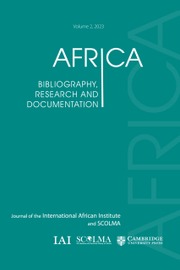I have only met Hans Zell in person once. However I have repeatedly benefited from his scholarship on African publishing. I have observed deep acts of generosity to African scholarship in Africa. Therefore it is an honour and delight to be asked by the editors to write an appreciation of Hans.
Hans the scholar of African publishing
Fifteen years ago, I was a greenhorn on publishing in general and on African publishing in particular. I reached for habits of academic research ground into me for over a decade: find the leading scholar who can offer you a comprehensive overview, identify the go-to bibliography, get the authoritative handbook to unfamiliar territory ahead. For African publishing, these resources usually came back to a single figure: Hans Zell. One of Hans’ magna opera is Publishing, Books and Reading in Sub-Saharan Africa: a critical bibliography (Zell [Reference Zell1996] 2008a). Blessed with the Publishing in Africa Collection at Oxford Brookes University down the road, Hans’ bibliography was invariably the first volume off the shelf. Over the years I have used it to research rights agreements between African and Euro-American publishers, training initiatives and manuals for African publishers and writers (Zell Reference Zell2002 sits on my shelf), digital publishing in Africa (that supposed silver bullet), publishing networks in Africa and more. With regard to rights agreements, I was directed to Henry Chakava’s article ‘And another thing … dealing with the British’, to be rewarded by Chakava’s threefold characterization of British publishers as ‘the good, the bad and the ugly’ (Chakava Reference Chakava1999: 52). Whatever the issue under investigation, the entries so carefully collected and summarized by Hans in A Critical Bibliography revealed the issue was often decades old and that there were sage heads from whom I could learn.
While A Critical Bibliography’s entries ended with its publication in 2008, Hans’s bibliographic endeavours did not. Every year we were treated to Publishing and the Book in Africa: a literature review (Zell Reference Zell2015a; Reference Zell2019), enabling me to spot any recent items on African publishing relevant to my own endeavours. As the author of Web Search for Local Communities in the Highlands of Scotland (Zell Reference Zell2011), Hans was omnivorous as to the publishing format of his entries: blog-posts were just as valid as academic journal articles. The pithy summaries invariably told me what was (and was not) worth consulting. In the month of writing this (November 2024), I yet again turned to Hans’s inventory of ‘Pan-African and regional book professional organizations, groups, and networks in sub-Saharan Africa’ appended to his insightful article on ‘The African university press – a gloomy picture’ (Zell Reference Zell2017c; Reference Zell2017b). It is salutary to be reminded just how hard it is to develop publishing structures within and between African countries, with Hans observing that some twenty odd of the twenty-six initiatives in his inventory are now defunct. It is testimony to Hans’s significant resolve to keep compiling, chronicling and publishing over decades in a field that is more characterized by lamentation than celebration.
Indeed Hans’s writing on African publishing eschews such false binaries. On the one hand there is frank honesty about and shrewd analysis of such failures, alongside calls for more empirical research into African publishing. Yet on the other, he robustly counters naysayers for whom Africa is some publishing terra nullius. This balance is exemplified in his two-part review of ‘Publishing in Africa: where are we now?’ with ‘Part one: some spurious claims debunked’ balancing ‘Part two: accomplishments and failures’ (Zell Reference Zell2008b; Reference Zell2009). It is extraordinary how much, not how little, is published each year in environments that would stop most Euro-American publishers in their tracks, not least an annual tsunami of ten million free books into African publishing markets (Zell Reference Zell2015b; Thierry Reference Thierry2015). I for one am deeply grateful for his balanced perspective, perseverance and bountiful sharing.
Hans the donor to Africa of scholarship on Africa
In December 2022, Terry Barringer, the editor of this journal, contacted me, informing me that Hans was looking for an institution on the African continent to which he might donate his collection of African Studies publications. This amounted to a total of 394 volumes, the majority in hardback, with a value of over £10,000. He could more easily, in comparison with what followed, have negotiated for a handsome sum the sale of the collection to a specialist Africanist bookseller in Bournemouth. Instead Hans donated his collection to the Jesuit Historical Institute in Africa, whose director Jean-Luc Enyegue has also written an appreciation of Hans for this volume. Hans and I then embarked on the challenge of how to transport some 350kg of books from Lochcarron, Scotland, to Nairobi, Kenya, which also entailed Hans and his wife, Anthea, boxing up the books and negotiating their way around the resulting cartons. The Zell dining room was unable to be used for its intended purpose for a good few weeks. The final result is that an outstanding collection of scholarly and reference publications is available in Kenya. Nor was this Hans’s first donation.
In 2015 Hans had donated a similarly significant collection on publishing and book development in sub-Saharan Africa alongside his online database on the same subject to Kwara State University, Nigeria. In 1995 he had donated his earlier collection on the same subject matter to the African Publishers Network in Harare, Zimbabwe. With these donations, Hans exemplifies the principle that Africans have the right to access scholarship about their continent on their continent. There will be future African researchers who will be deeply grateful to Hans and Anthea for their generosity and commitment to African scholarship in Africa.


